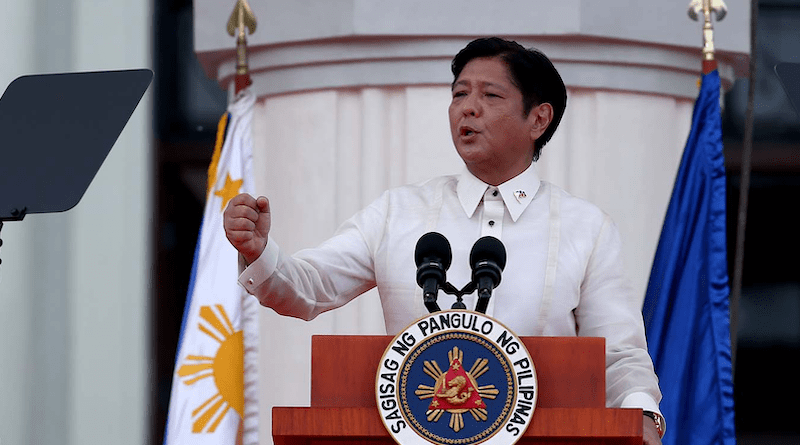Philippine Church Forced To Work With Dictator’s Son – OpEd
By UCA News
(UCA News) — In ancient times, the phrase “Vox Populi, Vox Dei” — the voice of the people is the voice of God — was almost a sacred incantation of every monarch.
When a king’s legitimacy was being questioned, all he needed to do was to resort to divine teaching that his rule was ordained by God because he was chosen by the people to be their ruler.
To seal the cap, the pope himself or a Catholic bishop crowns the king to symbolize the Catholic Church’s imprimatur of his kingship.
In the recent Philippine elections, however, the “vox populi” statement was put to the test.
Many Catholic clergymen and the country’s most influential prelates openly supported the candidacy of former vice-president Leonor Robredo.
For them, it was a moral crusade — a battle between good and evil — where no Catholic could stand on the middle ground.
Lingayen-Dagupan Archbishop Socrates Villegas said there was no room for neutrality in the face of evil, where one is faced with a moral choice to side with the good.
“Supposing there is a troll farm [that spreads lies] and here is a truth farm, can you remain neutral there? You cannot be neutral. When we are neutral and there is oppression, we end up empowering oppressors,” the archbishop said in a homily.
Villegas, who was the secretary of people power icon and former Manila archbishop, Cardinal Jaime Sin, was an open supporter of Robredo.
Besides the archbishop, the Catholic Bishops’ Conference released a strong pastoral statement condemning the alleged white-washing of Philippine history by Marcos supporters.
There was a social media crusade where thousands of trolls or fake accounts were allegedly paid by the president to claim that the country had experienced its golden years during the presidency of the late dictator, Ferdinand Marcos, Sr.
Catholic prelates called these efforts a “pandemic of lies” that led to historical revisionism.
“Dear Brothers and Sisters, let us stand up for truth. Remember: goodness without truth is pretense. Service without truth is manipulation. There can be no justice without truth. Even charity, without truth, is only sentimentalism,” the bishops said in a pastoral statement.
“An election or any process that is not based on truth is but a deception and cannot be trusted,” they added.
In that very statement, Catholic prelates once again portrayed the Philippine election as a battle between good and evil, urging Catholics to side with good.
“Listen to your conscience. Be the ones to decide. We trust in your capacity to discern what is true and good. We all seek the common good. And, in the light of the Gospel of Jesus, let us follow the path of truth, goodness, justice and peace — not the path of violence, vengeance or evil,” they said.
But the majority of the Filipino people did not see politics the way the Catholic hierarchy did or the way the bishops wanted the Catholic faithful to believe.
Ferdinand Marcos, Jr. won with over 30 million votes while Church-backed Leonor Robredo only had 14 million.
Despite overwhelming support from Catholic clergymen who organized and branded themselves as “Priests for Leni,” their words fell on deaf ears.
The people did not see the elections as a battle between good and evil. Neither was it an occasion to reflect on the martial law years under Marcos Sr.
The election was simply an occasion to vote for a candidate who, they believe, could help solve their woes.
According to the final survey of a private firm, 53 percent believed Marcos Jr was more pro-poor than Robredo. Some 75 percent believed he understood the situation of the poor better than the former vice president.
“Marcos was consistent in the survey — even in questions like who do you think is a stronger leader? Who do you think will lead you out of poverty? His name was always number 1,” political analyst Jomar Garcia told UCA News.
Clearly, the people did not consider morality in the election. It’s not that there was no room for it but perhaps they had thought it was not the proper occasion.
The results were also proof of the dwindling support of the Catholic hierarchy in the Philippines.
Gone are the days of Cardinal Sin when people would flock to the streets to oppose dictatorship or human rights abuses. Or perhaps the situation was entirely different.
Maybe the clergymen had thought it was the same so they dipped their fingers in politics only to find out the hard, annoying and frustrating reality of their influence.
A prominent Jesuit theologian recently rebuked clergymen and bishops who openly supported the former vice president in the election.
Father Eric Marcelo Genilo criticized the partisan political calling it “damaging” to the pastoral mission of the Catholic Church.
“The outcome of the 2022 presidential elections reflects the state of the Church’s gravely diminished moral authority and credibility in the political sphere,” Genilo said in a statement.
For the Jesuit theologian, clergymen who openly supported Robredo violated the provision of non-partisanship under Canon Law.
“The partisan clerical campaign ultimately failed to move the majority of Filipino voters. It failed not just because of misinformation or the political tactics of the Marcos campaign. It also failed because it was offensive to many Filipinos who have consistently rejected clerical partisan interventions in past elections,” Father Genilo wrote.
Cracks within the Catholic Church hierarchy have continued to haunt the Church and its influence on the Filipino people.
With the former dictator’s son occupying the highest office in the land, prelates and clergymen may have to swallow a hard pill to work with the administration and question whether the voice of the people is indeed the voice of God — something that every Catholic clergyman is expected to obey.
*The views expressed in this article are those of the author and do not necessarily reflect the official editorial position of UCA News.

